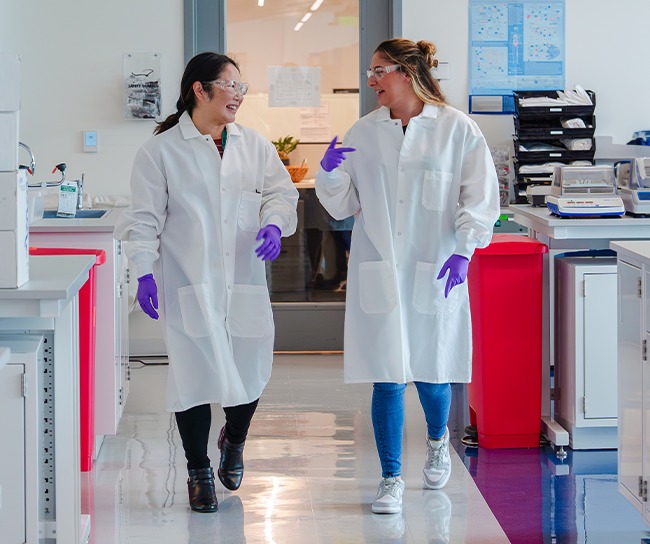
Immunology
We’re at the forefront of research, seeking to translate scientific discoveries into treatments for people with immune-mediated inflammatory disorders.
Research | Our focus | Careers I Collaborations
Our immunology research efforts
We have a proud legacy of developing novel therapeutics for people with immune-mediated inflammatory diseases and autoimmune-related disorders. Our deep knowledge of immuno-oncology and vaccines has laid the foundation for our scientists who are focused on drug discovery and development efforts for immune disorders.

With an advanced understanding of human biology, there's been an emergence of innovative medicines and new modalities that aim to change the way we approach treatment for immune disorders. We’re investigating targets that have been implicated in many autoimmune-related diseases, including tumor necrosis factor-like ligand 1A (TL1A), interleukin-2 (IL-2) protein and CD30L.

We’ve made significant investments over the past few years and hope to usher in a new era in immunology. We're pursuing biomarkers that could play a key role in identifying people who are more likely to respond to therapies. The ultimate goal is to be able to deliver the right medicine for the right patient at the right time.
Our focus on immunology research & treatments
It’s estimated as many as one in 10 people are living with immune disorders around the world. We’re accelerating our growing capabilities in immunology and evaluating new treatment options for people with certain immune disorders.
Inflammatory bowel disease (IBD)
Inflammatory bowel disease (IBD) is a chronic inflammatory condition affecting the digestive tract and impacting nearly three million people in the U.S. Crohn’s disease and ulcerative colitis are two of the most common forms of IBD. The unpredictable symptoms associated with IBD, which may include diarrhea, abdominal pain, unintended weight loss and fatigue, often create emotional and social challenges for those impacted.
Lupus
Systematic lupus erythematosus (SLE) is the most common form of lupus, a chronic multi-organ autoimmune disease primarily affecting women of childbearing age (15 to 44 years). It’s estimated that 1.5 million people in the U.S. have a form of the disease, with SLE accounting for approximately 70 percent of all cases of lupus. The cause of SLE is unknown, but symptoms occur throughout the body, depending on which organs or systems are impacted. People with SLE experience a different combination and severity of symptoms that may come and go and change over time, such as joint pains, skin rash, extreme fatigue or cognitive issues.
Atopic dermatitis
Atopic dermatitis, more commonly referred to as eczema, is a chronic condition that causes dryness, itchiness and inflammation of the skin. The condition can lead to sleep problems, stigmatization and lower quality of life and may worsen or improve over time, often in cycles of “flares” and “remissions.” Approximately 31.6 million people in the U.S. have atopic dermatitis.
Vitiligo
Vitiligo is a chronic autoimmune condition that occurs when melanocytes (skin cells that create pigment) are attacked by a person’s own immune system, causing a whitening of the skin or depigmentation in patches. Vitiligo often appears in a symmetrical pattern on both sides of the body, such as on both knees. It is frequently found on the hands, feet, arms and face, but body hair and mucous membranes, such as the inside of the mouth, may also be impacted. Up to 2.8 million people in the U.S. are impacted by vitiligo, which, outside of depigmentation, may lead to low self-esteem and inflammation in the eyes and ears.
Scleroderma-associated interstitial lung disease (SSc-ILD)
Systemic sclerosis is a rare autoimmune condition that affects connective tissue in the body, typically causing the skin to thicken and tighten. The disease can impact other organs and commonly manifests as interstitial lung disease, which affects the tissue and space around the air sacs of the lungs. Interstitial lung disease caused by systemic sclerosis is known as scleroderma-associated interstitial lung disease (SSc-ILD). Systemic sclerosis impacts approximately 100,000 people in the U.S., with interstitial lung disease occurring in more than half and often associated with a poor prognosis.
Hidradenitis suppurativa (HS)
Hidradenitis suppurativa, also known as acne inversa, is a condition that causes painful skin lumps, which are often mistaken for pimples and cysts. These lumps are typically found near hair follicles around sweat glands, including the groin, breasts and armpits. Without treatment, the condition can worsen and cause abscesses, or pockets of pus, that can break open and form scars, and may also lead to the formation of tunnels under the skin, called sinus tracts. Hidradenitis suppurativa can have long-term impacts, including decreased mobility due to scarring and chronic intense pain. An estimated 1% of the U.S. population is living with hidradenitis suppurativa and women are three times more likely than men to develop the condition.

Careers at Merck
Motivated to advance new research in immunology, we rely on world-class expertise. Our team is always growing, so join us and start making your impact today.
Business development & licensing
We follow the science where we can make the greatest difference, now and in the future. We’ve made significant investments over the past few years in immunology through business development and licensing opportunities.

Following our acquisition of Prometheus Biosciences, we hope to usher in a new era of care for immune disorders based on a precision medicine approach.

We acquired a novel, investigational clinical-stage bispecific antibody from Curon Biopharmaceutical with applications spanning both B-cell malignancies and autoimmune diseases.

We've entered into a strategic research collaboration with Culmination Bio to access both clinical and paired specimen (tissue and blood) data in an effort to identify patient cohorts in immunology.






